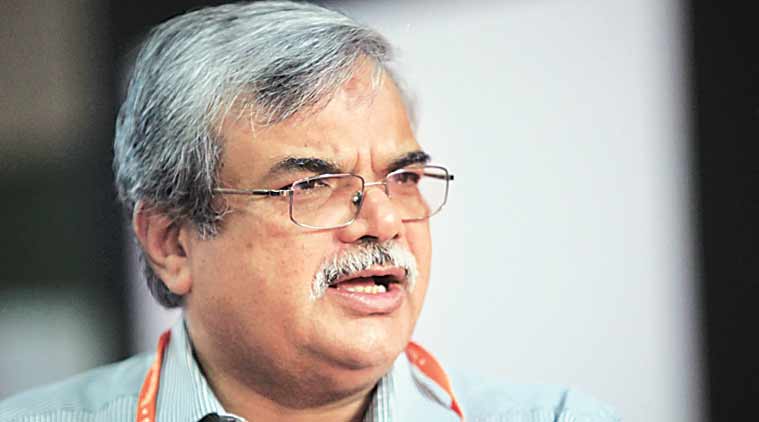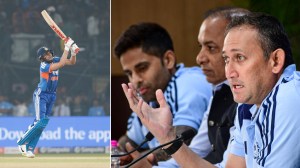Stay updated with the latest - Click here to follow us on Instagram
Top TIFR Scientist Warns: ‘In extreme claims of fringe elements, Indians stand to lose the most’
Attempts at making grandiose claims of past achievements are self-defeating, says Mayank Vahia.
 Indian Astronomy Olympiad Programme national coordinator Mayank Vahia says scientists will have to shed their traditional reserve and take on these groups who make ‘grandiose’ claims about the country’s past achievements in science.
Indian Astronomy Olympiad Programme national coordinator Mayank Vahia says scientists will have to shed their traditional reserve and take on these groups who make ‘grandiose’ claims about the country’s past achievements in science.
A senior scientist of the Tata Institute of Fundamental Research (TIFR) has warned of the potential risks of the work space of “rationalist scientists” being “squeezed” as they deal with a government “that is influenced by parochial considerations”.
Writing in the latest edition of the ‘Current Science’ journal, Mayank Vahia, national coordinator for the Indian Astronomy Olympiad Programme, says scientists will have to shed their traditional reserve and take on these groups who make “grandiose” claims about the country’s past achievements in science.
“In the extreme claims of the fringe elements, Indians stand to lose the most. It means that a rational and realistic study of India’s past is now a much maligned field, which no rationalist scientist or citizen will attempt,” he says in the journal that is published in collaboration with the Indian Academy of Sciences.
[related-post]
He makes a pointed reference to the 102nd Indian Science Congress in Mumbai earlier this year, where a paper claimed that the science of building and flying a plane was recorded by Maharishi Bharadwaj between 6000 and 7000 BC, centuries before Orville and Wilbur Wright built the aeroplane.
“This (the claim) is difficult to accept, when they had no detailed knowledge of geography beyond the Indian subcontinent. The idea that the earth was spherical was not even considered in India until AD 500, when Aryabhatta proposed the idea of heliocentric solar system,” the paper says.
Talking to The Indian Express, Vahia said that “attempts at making grandiose claims of past achievements are self-defeating”.
“Further, they destroy the credibility of the entire system and serious scientific studies of India’s past get discredited… They bring down the morale of contemporary scientists and divert attention and resources away from modern science and technologies,” he said.
According to Vahia, it was time to “expose” the fringe groups. “Scientists will have to arm themselves with a better understanding of the true achievements of the past, and then step forward and take on the fringe groups who are well-organised, well-funded, shrill and increasingly tolerated, if not encouraged, by the powers that be,” the paper says.
The article says the arguments made by this fringe group raise questions about our education system. “The very fact that irrational ideas hold sway over such a large group is a major failure of our educational system,” it says.
The paper says that to scientifically evaluate the past is easier than most people would imagine. It explains that the most common approach to getting a timeline is direct dating of archaeological remains with residues of human activity.
“The entire evidence for the early habitation by Sanskrit speakers in India is literary and there are few, if any, archaeological sites that can be directly associated with early Sanskrit speakers… Most importantly, the language of science is not Sanskrit, it is mathematics. While most sciences begin with descriptive recording of their work, true and rapid progress comes only after these results are put in mathematical format. Even the best works in Indian mathematics stop at the limiting value theorem that came up in the Kerala School between the 14th and 16th century AD,” Vahia argues.
Vahia’s views have received support from some of the country’s senior scientists. Dr Govind Swarup, one of the pioneers of radio astronomy and former centre director of TIFR’s National Centre for Radio Astrophysics, Pune, said, “I am surprised why Prime Minister Narendra Modi is not keeping these elements away from making irrational comments. I am glad someone has written about these fringe groups and I agree that more scientists should be vocal about it.”
Prof Naba Mondal, project director of the Tamil Nadu-based India-based Neutrino Observatory (INO) from TIFR, called it a well-argued article backed by logic, something “every practicing scientist should take note of”.
“I also agree that there is a lot in ancient science in a real way, so we don’t have to depend on imaginary ones to glorify our past,” said Mondal.







